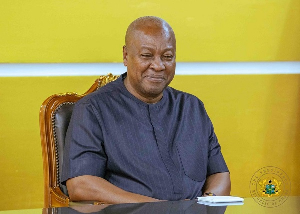Accra, March 8, GNA - About 800,000 children are expected to be out of school with deprived districts retaining fewer children in classrooms, an Education Sector Performance Report for 2007 has revealed. An estimated 20 per cent of these "out of school children" are between six and 11 years.
Most of the children are out of school because of the remoteness and inaccessible nature of such communities, unfavourable socio-economic and cultural factors.
In addition, economically challenged and seemingly intellectually weak pupils, with a poor parental background are sometimes not attracted to or retained in the formal school system.
The report said these children constituted "a critical mass, whose continues exclusion from the school system would make it difficult for government to achieve Education for All or Universal Primary Completion as stipulated in the Millennium Development Goals (MDGs)." Mr. Alex Tettey-Enyo, Minister of Education, announced this in a speech read on his behalf at the launch of this year's European Commission Drawing Competition for Children between eight and 10 years under the theme: "Gender Equality," in Accra on Monday.
The occasion also coincided with the celebration of International Women's Day which fell on March 8.
The competition which commenced in 2007 and celebrated annually was aimed at unearthing skills and talents in children in 58 countries across the globe.
The ultimate winner is expected to receive 1,000 Euros. The report, the Minister said also recorded a National Enrolment Rate (NER) of 81.1 per cent primary and 52.4 per cent for Junior High School (JHS) in 2007.
He said deprived districts also registered 74.5 per cent of enrolment for primary and 41.6 per cent for JHS.
"Respective completion rates at national level for primary and JHS as reported in the Education Sector Performance Report (2007), stands at 85.4 per cent and 65.0 per cent. Rates for deprived districts are 75.5 per cent for primary and 49.2 per cent for JHS," he added.
The Minister of Education noted that even though the current structure and performance of the formal basic education system did not allow any alternative education programme for out of school children, there were opportunities to re-orient these children into formal education. He said there had been much discussion and promotion of flexible school programmes to encourage them and lauded the role of non-state actors in providing informal education for them.
The Minster noted that government's intention to address the problems of out of school children had been captured in the Education Sector Plan, an initiative that would produce a policy document which would translate intentions into actions.
Mr. Tettey-Enyo was optimistic that the policy when implemented would ensure equity in educational opportunities and reduce poverty as well as streetism.
On the competition, he was hopeful that the drawing would help shape policies and develop interventions to address challenging situations. Touching on gender equality, the Minister noted that it was essential to growth and poverty reduction and key to reaching the MDG's and appealed to all and sundry to facilitate chance for equality.
"We need to ensure that from childhood, children are provided with as many opportunities as possible to help them make informed choices, which would enable them maximise their potential and values in society," he said. Mrs. Juliana Azumah-Mensah, Minister for Women and Children's Affairs (MOWAC), in a speech read for her, charged all stakeholders to identify and reflect on the relevant issues affecting gender equality and address them with seriousness in the interest of global development. Mr. Claude Maerten, Head of Delegation of the European Union to Ghana who launched the competition, pledged the union's continued commitment and support towards gender equity.
Ms. Evelyn Aseidu Agyemfra, Director in-charge of Finance and Administration, MOWAC, noted that the competition would help initiate and sustain the necessary changes in gender relations. Eligible competitors are to submit their work by posting or submitting them to offices of the European Commission by April 27, 2010.
General News of Monday, 8 March 2010
Source: GNA
About 800,000 children expected to be out of school - Report
Entertainment











